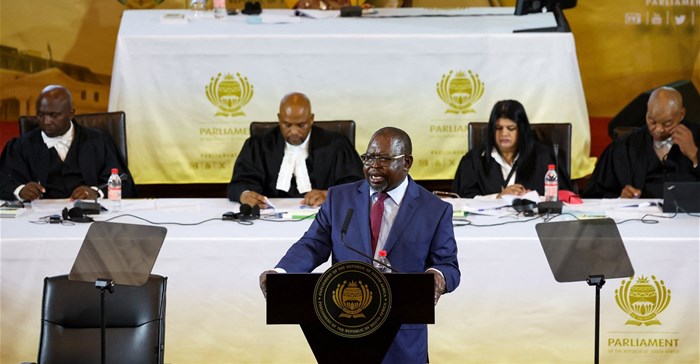
Subscribe & Follow
#BudgetSpeech2024: South Africa taps contingency reserves to limit rising debt

Africa's most industrialised economy has barely grown in more than a decade, with rising debt-servicing costs eating up a growing share of the national budget.
The bleak economic backdrop is looming large over a general election due on 29 May that could see the governing African National Congress party lose its parliamentary majority for the first time since the end of apartheid 30 years ago.
Presenting the 2024 budget, Finance Minister Enoch Godongwana said the unusual move to draw down R150bn ($7.93bn) from the Gold and Foreign Exchange Contingency Reserve Account (GFECRA) would not compromise the central bank's solvency and still leave sufficient buffers to absorb exchange-rate shocks.
GFECRA captures gains and losses on the country's foreign currency reserve transactions and has a balance of more than R500bn, larger than plausible reserve losses from rand appreciation, the Treasury said.
The government will receive R100bn in the next fiscal year to the end of March 2025, and R25bn in each of the following two years.
Treasury director-general Duncan Pieterse told reporters that in effect the government was using the reserve account to replace more expensive borrowing.
The rand gained modestly and the country's sovereign dollar bonds strengthened as investors were reassured about government funding needs.
Lower debt peak
Among revenue measures, the Treasury proposed R15bn tax increases next fiscal year to alleviate fiscal pressures.
Consolidated spending is seen rising to R2.6tn in fiscal year 2026/2027 from R2.4tn in 2024/2025, with increased allocations including health, education and the extension of a social grant introduced during the Covid era.
Gross debt is now projected to stabilise at 75.3% of gross domestic product in 2025/2026, below the 77.7% ratio seen in November.
The consolidated budget deficit in the current fiscal year that ends in March is seen at 4.9% of GDP, unchanged from November's forecast, and the economy is seen growing 1.3% in 2024, up from estimated growth of 0.6% in 2023.
A major constraint on growth has been rolling power cuts that have hurt businesses of all sizes, with utility Eskom implementing the heaviest outages ever last year.
South Africa also faces a logistics crisis as another state company, Transnet, struggles to provide adequate freight rail and port services because of equipment shortages, maintenance backlogs and rampant vandalism.
"Government is making the most out of very limited resources," Godongwana said.
"The budgets we have tabled since 1994, have been about securing the goal of growing the economy, so that we can do more to address the inequalities and deprivation that still scar our society and undermine the promise of democracy."
Source: Reuters

Reuters, the news and media division of Thomson Reuters, is the world's largest multimedia news provider, reaching billions of people worldwide every day.
Go to: https://www.reuters.com/








